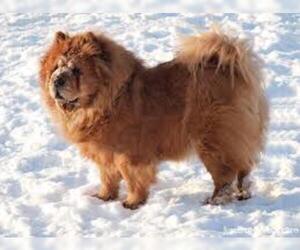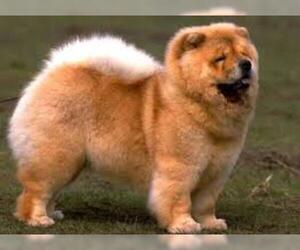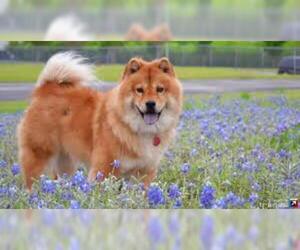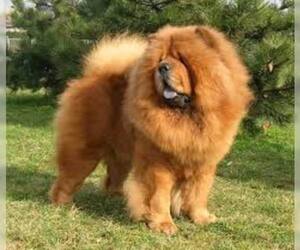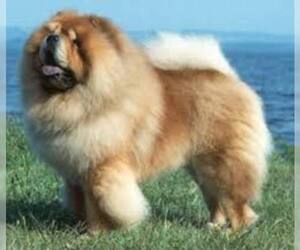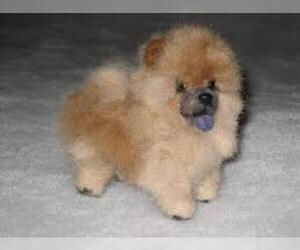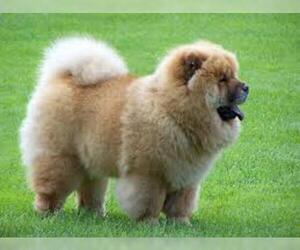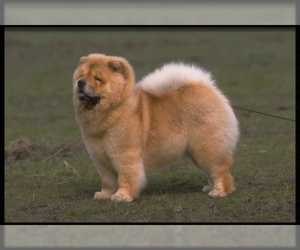
All about Chow Chow dog breed
A.K.A. :Lion Dog, Imperial Chow, Bear Dog, Chinese Chow, Canton Dog, Manchurian Chow, Heishi Gou, Xiao Heishi, Wolf Dog, Black-tongued Dog, Foo Dog, Fluffy Chow, Red Dog, Black Dog, Cream Chow, Blue Chow, Fawn Chow, Chows, Chowdie
Size
Grooming requirements
Exercise requirements
Good with other dogs
Watchdog ability
Energetic
Training requirements
Playful
Affectionate
Good with other pets
Good with children
Good with strangers
Winter
Summer
Healthiness
Protective
Life Span
| Pure Breeds | Member |
| Breeds A - Z | C |
| Breeds by Group | Non-Sporting Northern |
| Breeds by Trait | Low Shedding |
| Overview: | The Chow Chow, an ancient breed originating from China, is easily recognized by its distinctive lion-like mane, deep-set eyes, and unique blue-black tongue. These medium-sized dogs boast a dense double coat, which can be either rough or smooth, in a variety of colors including red, black, blue, cinnamon, and cream. Known for their reserved and independent nature, Chows often display a cat-like aloofness, making them more suitable for experienced owners who appreciate a dignified companion rather than an overly effusive one. While generally calm, their protective instincts can make them wary of strangers, so early socialization is crucial. They are adaptable to apartment living due to their moderate exercise needs, but require regular grooming to maintain their coat. Potential owners should be aware of breed-specific health concerns such as hip and elbow dysplasia, and certain eye conditions like entropion. |
F.A.Q.
All You Need to Know About the Chow Chow Breed
The majestic Chow Chow, originating from ancient China, is a truly distinctive breed. Known for its lion-like mane and unique blue-black tongue, this medium-sized dog boasts a dense double coat, requiring regular grooming to prevent matting. While often described as independent and reserved, Chow Chows are fiercely loyal to their families, though they can be wary of strangers. Their dignified and somewhat aloof temperament makes them better suited for experienced owners who understand their need for a firm yet gentle hand. They are surprisingly adaptable to apartment living due to their moderate exercise requirements, often content with a daily walk. However, early socialization is crucial for a well-adjusted Chow Chow. Common health concerns include hip and elbow dysplasia, as well as eyelid entropion. If you're looking for a devoted, calm companion with a regal presence, the Chow Chow might be your perfect match.Chow Chow Weight: Average Size & Healthy Weight for Chow ChowThe average weight for an adult Chow Chow is between 45-70 pounds.* Males: Typically weigh 55-70 pounds.* Females: Generally weigh 45-60 pounds.This range represents a healthy weight for Chow Chow adults.
Curious about the Chow Chow height and how tall these fluffy canines get? On average, a healthy adult Chow Chow stands between 17 to 20 inches (43-51 cm) at the shoulder. This range represents the typical adult height you can expect for this distinctive breed.
While this is the average size, there can be slight variations. Generally, males may be at the higher end of this spectrum, sometimes reaching the full 20 inches, while females might be closer to the 17-inch mark. However, individual genetics play a significant role, so it's not uncommon to see a particularly robust female or a slightly more compact male Chow Chow.Factors like the dog's specific lineage, nutrition during growth, and overall health can all influence a Chow Chow's final adult height. When considering a Chow Chow, keep this Chow Chow average height in mind to ensure they'll fit comfortably into your living space and lifestyle!Chow Chow Colors:The Chow Chow breed displays a beautiful range of coat colors. AKC recognized Chow Chow colors include red (ranging from light gold to deep mahogany), black, blue, cinnamon (a lighter, yellowish-red), and cream (white with a cream tinge). These are the standard and most commonly seen varieties.Beyond the officially recognized, you may encounter rare Chow Chow colors and exotic Chow Chow variations. These include fawn, a lighter, often dilute red; white, a true, unpigmented white; and lilac (also known as Isabella), a dilute brown with a pinkish hue. Other extremely rare and often unaccepted variations can include chocolate (a rich brown), silver, and even brindle or merle, though these last two are highly uncommon and generally considered non-standard, often indicating mixed breeding rather than purebred Chow Chow genetics by most major kennel clubs. Potential adopters should note that rare coat types and exotic Chow Chow variations may command higher prices due to their rarity, but they are not typically accepted in the show ring by organizations like the AKC. Always verify the breeder's claims and health clearances, especially when considering non-standard colors.
The Chow Chow personality is often described as dignified and independent, making them a unique companion. They are generally not overtly friendly with strangers but display immense loyalty and affection towards their family. Chow Chows are not highly social with other dogs and typically prefer to be the sole pet. Their reserved nature means they are generally not suitable for very young children or homes with multiple boisterous pets, requiring careful supervision and early socialization to ensure harmonious living. While they can adapt to apartment living due to their relatively low exercise needs, a securely fenced yard is preferred, and mental stimulation is crucial. Their independent temperament of Chow Chow means they are not overly eager to please and require consistent, positive reinforcement training from an early age. They are known for their quiet demeanor and can be quite placid indoors once their exercise needs are met.
Chow Chow Temperament & PersonalityThe Chow Chow temperament is often described as dignified, independent, and discerning. They are typically reserved and can appear aloof, not generally fawning or overtly affectionate, even with their families. This breed is known for its loyalty to its primary caregiver and immediate family, but they are not the most demonstrative of breeds.Friendliness and Sociability: Chow Chows are generally not highly sociable dogs and are often indifferent to strangers. They are not known for their eagerness to make new friends and can be wary of unfamiliar people or animals. Early and consistent socialization is crucial to help them develop into well-adjusted adults, but even then, they may remain reserved.Adaptability to Apartment Living: With adequate exercise, Chow Chows can adapt to apartment living due to their relatively low energy levels indoors. They are not prone to excessive barking and are content to relax inside, often preferring a quiet environment. However, they do benefit from outdoor access for mental stimulation and bathroom breaks.Behavior with Children and Other Pets: Chow Chows are generally not recommended for homes with small children due to their independent nature and potential for sensitivity to rough play. They can be tolerant of older, respectful children who understand how to interact with a reserved dog. Their strong prey drive and dominant tendencies mean they are often not well-suited for living with other pets, particularly those of the same sex or smaller animals. Careful introductions and supervision are essential if considering a multi-pet household.Stubbornness and Sensitivity: This breed can be quite stubborn and possess a strong will, making training a challenge for novice owners. Patience, consistency, and positive reinforcement methods are key. They can also be surprisingly sensitive to harsh corrections or yelling, which can make them withdraw or become more resistant. A firm yet gentle approach is best.Overall, the Chow Chow is a unique and regal companion dog best suited for experienced owners who appreciate an independent and loyal, rather than overtly effusive, canine companion. They offer quiet devotion to their chosen people.
Chow Chow Care: Essential Daily Maintenance & Health TipsCaring for a Chow Chow involves understanding their unique needs. Grooming needs are significant: their dense double coat requires daily brushing (especially during shedding seasons) to prevent matting and maintain skin health. Professional grooming every 6-8 weeks is also recommended. Despite their sturdy appearance, Chow Chows are a low-energy dog breed. They need moderate, regular exercise – a daily walk of 20-30 minutes is usually sufficient to keep them healthy without overexertion.Dietary considerations are crucial for Chow Chow care. They are prone to weight gain, so a high-quality, balanced diet with controlled portions is essential for weight management. Due to their brachycephalic (short-nosed) anatomy, climate sensitivity is a major concern. Chows overheat easily; they must be kept cool in warm weather and avoided strenuous exercise during hot periods.Regular wrinkle and ear cleaning is vital to prevent infections, as moisture and debris can accumulate in these areas. For overall health tips for Chow Chow, be aware of common health concerns. They are prone to skin issues (like hot spots and pyoderma), requiring diligent grooming and regular checks. Dental care is equally important; regular brushing and professional cleanings help prevent periodontal disease. Proactive care for these aspects ensures a healthy, happy Chow Chow.
The Chow Chow activity level is generally low to moderate. These dignified dogs are not overly energetic and are well-suited for households seeking a more relaxed companion. They balance short bursts of playful energy with long periods of rest, often enjoying lounging and observing their surroundings.
Their daily Chow Chow exercise needs are minimal compared to many breeds. Typically, two short to moderate walks per day (around 15-20 minutes each) are sufficient to keep them healthy and stimulated. Leash walks are preferred, as their independent nature can make off-leash recall challenging.When it comes to playtime, Chow Chows appreciate gentle interaction rather than intense, prolonged games. Short sessions of fetch or light tug-of-war are usually enough to satisfy their playful side. It's crucial to remember their brachycephalic (short-nosed) anatomy. Due to this, they are prone to overheating and respiratory difficulties, especially in warm weather or during strenuous exercise. Therefore, all physical activity should be monitored carefully, and they should always have access to water and shade.How active are Chow Chow? They are decidedly not suited for highly active families looking for a jogging or hiking partner. Instead, they thrive in low-energy households that appreciate their calm demeanor and independent spirit. They are excellent companions for individuals or families who prefer a more sedate pace of life.Common Chow Chow Health Problems & Care Tips
The beautiful Chow Chow, with its distinctive appearance, is prone to several common Chow Chow medical issues that potential owners should be aware of. Their unique anatomy, particularly their flat face (brachycephalic) and dense coat, contributes to these concerns.One of the most significant concerns is Brachycephalic Obstructive Airway Syndrome (BOAS). This condition, prevalent in flat-faced breeds, results from narrowed nostrils, an elongated soft palate, and a constricted trachea, making breathing difficult. Symptoms include noisy breathing, snoring, and exercise intolerance. For brachycephalic dog care, it’s crucial to keep them cool and avoid over-exertion.Hip dysplasia is another frequent orthopedic issue, where the hip joint doesn’t develop properly, leading to arthritis and pain. Regular vet check-ups and a healthy weight can help manage this.Due to their numerous skin folds, skin fold infections (pyoderma) are common. Regular cleaning and drying of these folds are essential to prevent bacterial and fungal growth. Allergies are also prevalent in Chow Chows, manifesting as skin irritation, itching, and ear infections. Identifying and avoiding triggers, along with veterinary treatment, is key.Spinal problems, such as intervertebral disc disease, can occur, causing pain and mobility issues. Watch for signs of discomfort or reluctance to move.Lastly, their thick double coat makes them highly susceptible to heat sensitivity and heatstroke. Always provide plenty of shade and water, and avoid strenuous activity during warm weather to how to keep Chow Chow healthy and comfortable. Understanding these Chow Chow health problems helps owners provide the best possible care for their beloved pet.Breed Breakdown: What Experts Say About the Chow Chow
I would rate the "Size" trait of the Chow Chow breed a 6 out of 10.Chow Chows are a medium-sized breed, not truly small and certainly not giant. They typically stand between 17 and 20 inches tall and weigh anywhere from 45 to 70 pounds. Their sturdy, compact build, dense coat, and muscular frame give them a substantial presence, often appearing larger than their actual measurements might suggest. When compared to other companion dogs, they are considerably larger than toy breeds like Chihuahuas or even small terriers, but significantly smaller than Great Danes or Irish Wolfhounds. This puts them squarely in the mid-range. Due to their moderate size and often laid-back demeanor indoors, they can be suitable for apartment living, provided they receive sufficient outdoor exercise. Their size generally makes them manageable for travel in a car, though flying would likely require a large crate in cargo. For households with space constraints, they are a better fit than a truly large breed, but they still require their own designated space and aren't ideal for exceptionally cramped quarters.
I'd rate the Chow Chow's grooming requirements as an 8 out of 10, placing them firmly in the very high-maintenance category. While they might not have the extreme skin fold issues of some brachycephalic breeds, their dense, double coat is the primary driver of this high rating. This luxurious coat sheds heavily year-round, with even more intense "blows" twice a year, requiring daily brushing (often 30-60 minutes) to prevent matting, especially in the ruff and britches. Without consistent dematting, painful mats can form quickly, leading to skin irritation and infections. Their thick coat also makes them prone to overheating, so proper brushing helps with air circulation. Bathing needs are moderate (every 4-6 weeks) but become a significant undertaking due to the sheer volume of fur to wet, shampoo, rinse, and thoroughly dry, which can take hours and requires a high-velocity dryer to prevent hot spots. Nail trimming is standard for any dog but essential to prevent overgrowth. Ear cleaning should be regular, as their dense fur can trap moisture, increasing the risk of infections. While not inherently more prone to skin allergies than other breeds, any allergies they do develop can be harder to manage due to their thick coat making examination and topical treatment more challenging. Compared to many other companion dogs, the Chow Chow is definitely not easy to care for and requires frequent, specialized, and time-consuming grooming to maintain their health and appearance.
I would rate the Exercise Requirements of the Chow Chow breed a 3 out of 10.Chow Chows have surprisingly low exercise needs, especially considering their substantial size. They are not naturally high-energy dogs and are quite content with a moderate amount of daily activity. Their brachycephalic (short-nosed) anatomy significantly limits their ability to tolerate strenuous or prolonged exercise, particularly in warm weather, as they are prone to overheating and respiratory distress.Daily activity recommendations typically involve one or two short, leisurely walks – around 15-30 minutes each – and perhaps some gentle playtime in a securely fenced yard. They are not built for sustained running, agility, or high-impact sports. While they benefit from mental stimulation through puzzle toys or short training sessions, their physical demands are minimal. They thrive with a routine that includes these short bursts of activity rather than requiring structured, intense exercise programs to stay healthy and mentally stimulated. In fact, over-exercising a Chow Chow can be detrimental to their health.
I'd rate the Chow Chow's "Watchdog Ability" at a 9 out of 10.Chow Chows are exceptionally vigilant and effective as household watchdogs. Their alertness is remarkable; they are highly attuned to their surroundings and quick to notice any changes or unusual activity. This breed's barking behavior is deliberate and serves a purpose – they are not incessant barkers, but when they do bark, it's typically a deep, resonant sound meant to alert. Their territorial instincts are strong, and they consider their home and family their domain, which they are prepared to defend. They respond to unfamiliar sounds or people with an immediate and often imposing presence, their characteristic "scowl" and independent nature adding to their deterrent effect. While they are known for their aloofness, this doesn't diminish their protective qualities; rather, it means they are less likely to be swayed by strangers. They are absolutely capable of providing meaningful early warnings and their imposing appearance and assertive demeanor are often enough to deter intruders. They are far from passive companions when it comes to safeguarding their home.
I would rate the "Good with Other Dogs" trait of the Chow Chow a 3 out of 10.Chow Chows are generally known for their independent, aloof, and often dominant nature, which extends to their interactions with other dogs. They were historically bred as guard dogs and companions, not for extensive pack work, and their protective instincts can lead to distrust or even aggression towards unfamiliar canines. While a well-socialized Chow Chow might tolerate other dogs, particularly those they have grown up with and established as part of their "pack," their default setting is not one of enthusiastic sociability. They tend to be less adaptable to dogs of varying sizes and energy levels, often preferring to maintain their personal space and exhibiting intolerance towards boisterous or overly playful dogs. Multi-dog households with Chow Chows require careful introductions, consistent supervision, and a clear understanding of the Chow's hierarchical tendencies. They rarely thrive in canine company in the way many other breeds do, and generally require careful management and continuous training to coexist peacefully, rather than naturally embracing new doggy friendships.
I would rate the "Energetic" trait of the Chow Chow at a 3.Chow Chows are renowned for being a relatively low-energy and laid-back breed compared to most other companion dogs. They are not naturally active or highly playful, often preferring to observe rather than actively participate in strenuous activities. While they do require daily walks to maintain health and prevent boredom, their endurance is quite limited. You won't find a Chow Chow eager for long runs, intense games of fetch, or agility courses. Their brachycephalic (short-nosed) anatomy significantly affects their stamina and exercise tolerance, making them prone to overheating and respiratory distress with prolonged or vigorous activity, especially in warm weather. This physical limitation further contributes to their low energy needs and reinforces their preference for a more sedate lifestyle. They are content with moderate, leisurely strolls and ample rest, rather than extensive physical stimulation.
I would rate the "Training Requirements" of the Chow Chow breed at a 9 out of 10.Chow Chows are notoriously independent and possess a high degree of stubbornness, making them one of the more challenging breeds to train. While they are intelligent, their intelligence is often channeled into their own desires rather than a keenness to please their human. Their attention span for repetitive tasks can be quite short, and they are not inherently responsive to commands unless they see a clear benefit for themselves. Consistency is absolutely paramount – any lapse in expectations will be exploited. Positive reinforcement, particularly with high-value treats and praise, can be effective, but it needs to be carefully timed and consistently applied to break through their aloof nature. This breed is definitely not beginner-friendly and requires experienced handling, immense patience, and a very structured routine from a young age. Their owner needs to establish themselves as a confident and consistent leader, otherwise, the Chow Chow will happily take on that role.
I'd rate the Chow Chow's "Playful" trait a 3 out of 10.Chow Chows are generally a very dignified and independent breed, known for their calm and somewhat serious demeanor. They are far more laid-back than naturally spirited. While a Chow may enjoy a short, low-key play session on their own terms, their typical activity level is moderate at best, and their love for highly interactive games is generally low. They aren't prone to attention-seeking through boisterous play and often show a reserved response to toys and playtime. Their overall enthusiasm in daily life leans towards a quiet contentment rather than an energetic zest, making them less inclined towards the high-energy, fun-loving interactions often seen in other companion breeds.
I would rate the Affectionate trait of the Chow Chow breed a 4 out of 10.Chow Chows are often described as having a cat-like personality, which means they are generally quite independent and not overtly demonstrative with their affection. While they are incredibly loyal to their family and form strong bonds, they typically express this loyalty through quiet companionship rather than effusive displays of love. They appreciate their human companions and will often want to be in the same room, following their family members around in a more watchful than clingy manner. However, they are not typically "cuddlers" or lap-dogs, and often prefer their personal space. They are sensitive to their owner's emotions and will offer a quiet presence, but they don't necessarily thrive on constant physical affection or effusive praise in the way many other companion breeds do. They are more reserved and dignified in their affection compared to most dog breeds, preferring a more understated devotion.
I would rate the "Good with Other Pets" trait of the Chow Chow a 3 out of 10.Chow Chows are generally not naturally sociable with other animals, including other dogs and cats. Their strong prey drive, particularly towards smaller, quick-moving animals like cats, is a significant concern. They also have a history of being independent and can exhibit strong resource guarding tendencies over food, toys, and even their owners, which can lead to conflict in multi-pet households. While early and consistent socialization from puppyhood can help some Chow Chows tolerate other pets, it rarely translates to genuine "friendliness." Even with extensive training and supervision, they often require constant management and a careful introduction process to coexist peacefully, and even then, there's no guarantee of a harmonious relationship. They are much better suited to being the only pet in a household or in homes with very specific, well-managed multi-dog dynamics where the other dogs are calm and respectful.
On a scale from 1 to 10, the Chow Chow's "Good with Children" trait rates a 3.The Chow Chow is generally not a breed naturally suited for families with young children. Their independent and often aloof temperament means they lack the inherent playfulness and patience that makes many breeds excellent with kids. They have a low tolerance for boisterous behavior, loud noises, and the often clumsy handling that comes from young children. While they can be devoted to their own family, they are not typically demonstrative in their affection and may resent being treated like a giant stuffed animal. They are not known for being naturally gentle, and their strong-willed nature means they require extensive socialization from a very young age and consistent, firm training to coexist peacefully with children. Even with proper training and supervision, they are generally better suited to homes with older, more respectful children who understand how to interact calmly and appropriately with a dog, rather than active, playful youngsters. Their protective instincts can also be misdirected without careful guidance.
Rating the "Good with Strangers" trait of the Chow Chow on a scale of 1 to 10, I would place it at a 3.Chow Chows are a highly reserved and independent breed, naturally aloof with unfamiliar adults. Their typical behavior around strangers is characterized by indifference, but can quickly escalate to suspicion or guarding if they perceive a threat to their family or territory. They are not inherently friendly or sociable with outsiders and do not typically seek interaction or attention from those they don't know. While a well-socialized Chow Chow might tolerate the presence of guests, they are unlikely to be welcoming or playful. Their guarding instincts are strong, and they are prone to barking at unfamiliar sights or sounds. Adaptability in public or guest-filled environments is generally low; they prefer quiet, predictable settings and can become stressed or reactive if overwhelmed. This reserved nature is deeply ingrained in the breed and, while extensive socialization and training can help them be more tolerant, it will rarely make them truly outgoing or comfortable with strangers. They will always maintain a degree of dignified distance.
I would rate the Chow Chow's "Winter" tolerance at a 9.Chow Chows possess an exceptionally thick double coat, providing superior insulation against cold temperatures. Their dense undercoat acts like a natural down jacket, and the longer, harsher outer coat helps shed snow and ice. They also have a sturdy build and are not overly lean, contributing to better heat retention. While their brachycephalic anatomy *can* make them more susceptible to respiratory issues in extreme heat, it generally doesn't significantly hinder their cold tolerance; in fact, their smaller snout surface area might even help reduce heat loss compared to a longer-nosed dog in very cold, dry air. They are not particularly prone to hypothermia in typical winter conditions and can generally enjoy outdoor activities like walks and play in cold climates without undue risk. Compared to many other companion dogs, Chow Chows generally require *less* special care in winter, often thriving in cooler temperatures where other breeds might shiver. The main consideration is ensuring they have access to shelter and aren't left out indefinitely in sub-zero temperatures, as no dog should be. However, they are far more equipped for winter than most breeds and often seem to prefer it.
The Chow Chow breed rates a 2 for summer tolerance. Their brachycephalic (short-nosed) anatomy significantly hinders their ability to cool themselves efficiently through panting, making them highly susceptible to overheating. They also possess a dense double coat, which, while providing insulation in colder climates, traps heat in warmer temperatures. This combination puts them at a high risk of heatstroke, even with moderate activity. Compared to other companion dogs, Chow Chows require exceptional care during summer months. They should have limited outdoor activity, especially during the hottest parts of the day, and absolutely require access to air-conditioned environments. Leaving them outdoors for extended periods in warm weather is dangerous and can be life-threatening. Owners must be vigilant for signs of overheating, as their ability to regulate body temperature is severely compromised.
I would rate the Chow Chow's "Healthiness" trait as a 4 out of 10.While a responsible breeder and diligent owner can certainly mitigate some risks, the Chow Chow is generally not a robust breed. They are prone to a significant number of breed-specific health issues, including a high incidence of hip and elbow dysplasia, patellar luxation, and various eye problems like entropion and glaucoma. Their characteristic thick coat requires extensive grooming and makes them susceptible to overheating, especially in warmer climates, which can lead to heatstroke. Furthermore, their brachycephalic (short-nosed) facial structure, though less extreme than some other breeds, can contribute to breathing difficulties, particularly under stress or during exercise. Skin conditions and allergies are also relatively common. Their average life expectancy, around 9-12 years, is on the lower end compared to many other companion dogs. Overall, they are considered a relatively high-maintenance breed from a health perspective due to their genetic predispositions and the need for careful preventive care and monitoring.
I would rate the Chow Chow's "Protective" trait at an 8 out of 10.Chow Chows are inherently alert and possess strong territorial instincts, deeply loyal to their immediate family. This combination makes them excellent watchdogs, as they are quick to notice anything out of the ordinary and will vocally alert their owners to the presence of strangers or perceived threats. Their reserved and sometimes aloof nature means they are generally wary of unfamiliar people, and while they may not be overtly aggressive without provocation, their imposing physical presence and serious demeanor often act as a significant deterrent. They are more than just companion dogs; their protective instincts are genuine and deeply ingrained. While they are not typically trained as aggressive guard dogs in the same vein as some working breeds, their natural inclination to protect their territory and loved ones means they are quite capable of offering meaningful protection in a household setting, both through their deterrent presence and their willingness to intervene if they feel their family is truly in danger. They won't back down easily, making them a formidable presence.
I would rate the "Life Span" trait of the Chow Chow a 6 out of 10. Chow Chows typically have an average life expectancy of 9 to 12 years, which places them in the average range when compared to other companion dog breeds. While not considered short-lived, they don't reach the exceptional longevity seen in some smaller breeds. They are predisposed to certain health issues that can impact their lifespan, such as hip and elbow dysplasia, patellar luxation, entropion, and certain types of cancer like lymphoma and gastric carcinoma. Responsible breeding practices aimed at screening for these genetic conditions, along with proper nutrition, exercise, and veterinary care, play a significant role in helping individual Chow Chows reach the upper end of their life expectancy.
Chow Chow Puppies for saleSee all puppies for sale
Chow Chow Dogs for adoptionSee all dogs for adoption
Chow Chow BreedersSee all breeders
Similar Dog Breeds for Chow Chow
Breed Mixes of Chow Chow
Quick Breed Selector 0 - not important, 1 - smallest, 10 - largest
Variants & Mistakes :Chowchow, Chauchau, Cho Chow, Chow Chows, Chowchows, Chowhow, Chowhows, Chocow, Chocows, Chows, Chaw Chaw, Cheow Cheow, Chocho, Chau Chau, Chow-Chow, Chawchow, Chaowchow, Chao Chow, Cho Cho, Chow Chowss, Chawchaw, Chaowchaow, Chaou Chaou, Chau Chaus, Choh Choh, Choo Choo, Choow Choow, Chou Chou, Chows Chows, Chowe Chowe, Chaw Chows, Chaow Chows, Chowchoww, Chowchaw, Chowcho, Chochows, Chowchaws, Chawcaw.
